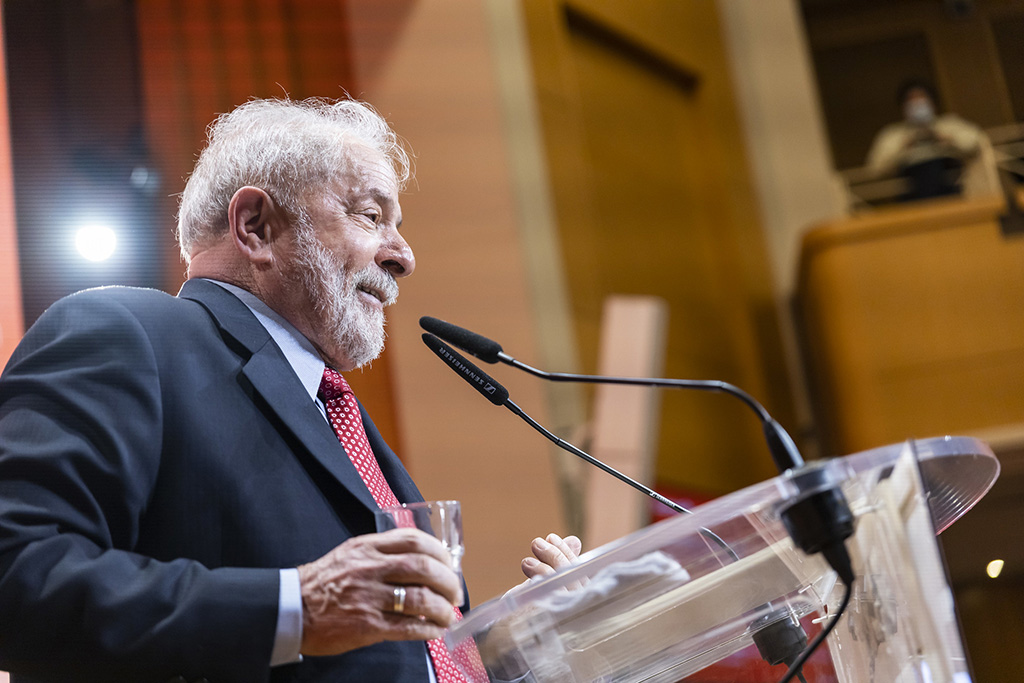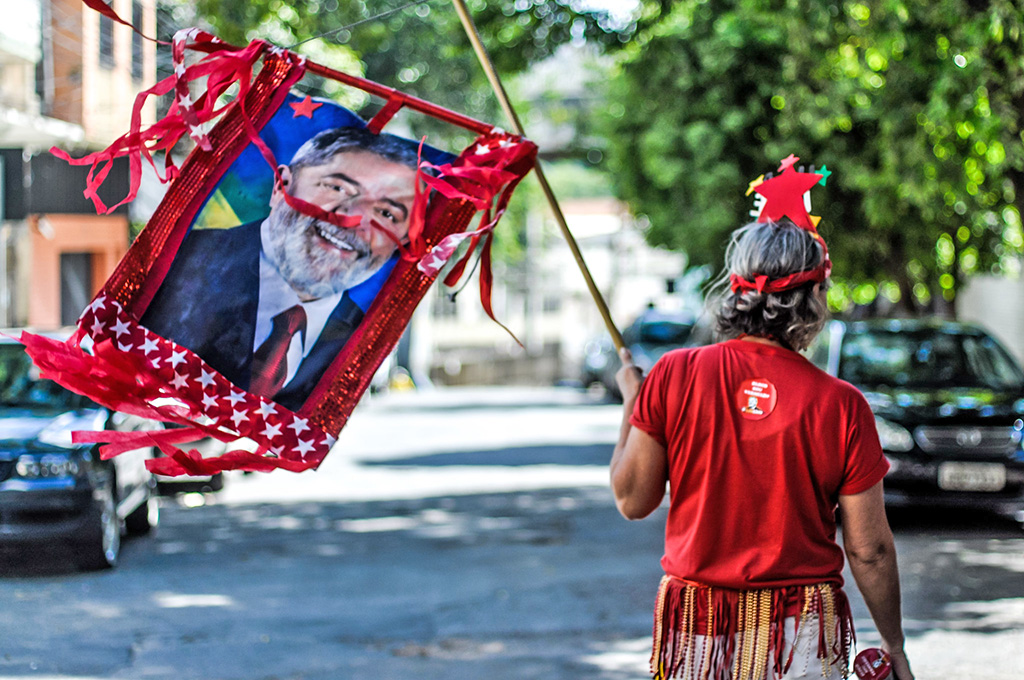More than an option, voting for Lula is becoming a historical necessity.
By Adriana Doyle Portugal and Eduardo Alves
Gramsci, a man committed to life and to the best conditions for human existence, once said that he “hated the indifferent”. The commitment of the Italian revolutionary, of very humble origins, did not allow him to be indifferent. This is Pressenza, a collective with diversity and multiple visions, positions and convictions, but which is unified in the path, without violence, towards the transformation of politics for the good life. That said, and reaffirming the importance of unity and debate for the collective intelligence that broadens and strengthens us, it is worth asking: why vote for Lula in the second round of the presidential elections in Brazil in 2022?
We have some fundamental reasons to affirm the need to vote for and elect Lula to the presidency of Brazil in 2022. Among the fundamental reasons we highlight, at this moment, only four that we consider central and decisive for the debate in this territory of unity that constitutes us.
The first reason derives from the objective analysis of reality, from the point of view of the global situation and also of the political context in Brazil. We will approach it from the theoretical-political problematic of imperialism and its development. Broadly speaking, we know that the recent threat to the US empire from the new emerging powers on the world stage triggered, among other historical phenomena, the hybrid war against Brazil, more specifically since 2013. In other words, the US government – faced with the Eastern threat led by China, together with India and Russia in the imperialist territorial dispute – sought to take Latin America by storm, in which Brazil, in recent governments, played a strategic leadership role, not only economically, but especially politically.
With the governments led by Lula and Dilma, the design of a strengthened Latin American bloc had its contours increasingly defined, in a historical process that relied on the economic development model adopted in Brazil during this period. In this sense, Brazil exported considerable capital to Latin American countries, concentrated and centralised capital, and insinuated itself as a power-empire in the continent. The export of oil capital became central, since the energy question is fundamental for the development of capitalism in the emerging countries, within the imperialist scenario: without energy potential, industrial development is compromised while China, for example, continues to be based on coal. It is no coincidence that the US empire, under the pretence of defending democracy, invades the Middle East in order to dominate the territory and cut off the flow of oil destined, also from Latin America, for China’s industrial development. So, synthetically, in order to invade and dominate Latin America and end, among other things, the geopolitics of the Lula and Dilma governments, the real powerful promoted the coup d’état and – with robust investment and support from the economic and financial oligarchies – elected Bolsonaro as president of Brazil. Bolsonaro was not – and will not be – the perfect candidate for that enterprise, but he served as a Bonapartist glove to the need of the threatened US empire. And so it was done.
In this sense, Lula and Bolsonaro have very different functions in the global conjuncture of imperialist dispute in process, and they have an absolutely different role in the geopolitics of the American container! It is not possible to consider them equivalent. Lula has the political capacity to lead the process of strengthening Latin America in the face of imperialism, above all because of his popular support base, having the capacity to reposition Brazil in a favourable way in world geopolitics.
The second reason is specific to the national context, although it is explained by the above. It refers to the symptom of the fascist threat in Brazil, led by Bolsonaro’s belligerent aesthetic. We also know – and we can always learn from history – that the rise of fascism in Europe was the subject of important analysis, debate and tactical orientations for the labour movement. One of the questions posed to the workers’ movement was whether there was a difference between bourgeois democracy and fascism, as two sides of the coin of bourgeois domination against the workers. We know that the democratic regime in force in the world is an expression of bourgeois regimes, as is fascism. However, there is a substantial difference between the two, not by chance highlighted by Trotsky in that debate: democracy presupposes our existence, fascism requires our annihilation.

Photo by Oliver Kornblihtt /Mídia NINJA
It is worth remembering that it was the Stalinists who argued that democracy and fascism were indistinct. No, they are not! Fascism aims to guarantee the interests of the hegemonic sectors of the bourgeoisie at the cost of destroying the existence of workers’, popular and system-critical organisations.
Fascism, as the highest expression of authoritarianism in all its dimensions, seeks to destroy the organised sectors as well as the many collectives and social movements concerned.
They want to destroy us, to annihilate our existence.
In democracy there is room for dispute and the possibility to exist and to organise.
Not in fascism. So, considering the fascist threat, voting for Lula makes a big difference. Lula and Bolsonaro are antagonistic expressions of the legal, political and ideological superstructure and, for us, this makes all the difference.
The third reason for voting for Lula is a response to the confusion of conception that can arise between what is the electoral process and what is government. Elections are not government; they are very different moments. This means – and history also has much to teach us in this respect – that the partnerships and alliances made for the electoral process do not define the government, the programme and the correlation of forces that will follow during the electoral process. It is clear that alliances indicate paths, but they do not determine them.
The government is the process of building and realising a programme that materialises in the relationship with the social sectors, with the working class, with the movements and, above all, with the position in world geopolitics, something in which Lula has significant differences with Bolsonaro! The programme of a government is not what is written on paper, nor what is said in the elections. It is the result of the correlation of forces that will tend towards living well to the extent that we, on this side, can consolidate and amplify the FORCE so that the rod of history is twisted in our favour and not against us. And with Lula that is possible. With Bolsonaro it won’t be. Lula is not the candidate of the powerful. Lula is being chosen by some powerful people because the Brazilian Bonaparte is stronger than expected and can escape their control. Lula is not the candidate of the bourgeoisie; Lula is the candidate of the workers.
]The fourth reason concerns the political significance of the governments of Lula and Dilma, which gives us important responses for those who think that “it doesn’t matter”. In fact, with both Lula and Bolsonaro the bourgeoisie will remain the economically dominant class, but under very different conditions. In the Communist Manifesto, Marx teaches us the importance that the workers’ struggle had for the workers’ organisations and the workers’ movement, even if it was alongside bourgeois sectors in certain historical periods.
There are historical moments when there is no political and organisational FORCE for us to overcome the contradictions created in capitalism itself. After all, for the dominant sectors that own the commons and also for us, the prevailing policy is not made with willpower. Conditions and socially accumulated FORCE are necessary for the desired policy to exist.
That is why it is worth insisting that it is our task to expand rights, democracy and humane living conditions.
Proposals like the universal and unconditional basic income, for example, which is fundamental for countries like Brazil, gain more force and conditions to be conquered in a Lula government and, therefore, the position of voting for Lula is fundamental for our aspirations. After all, under which government will we have the conditions to grow, to strengthen ourselves and to advance in the cracks of freedom and collective intelligence on the road to living well? The FORCE of Lula’s support base makes all the difference in this correlation of forces. Lula is not the candidate of the bourgeoisie, nor will he maintain bourgeois agendas in the same conditions as Bolsonaro will. Lula will not accept any agenda and that resistance will be broader depending on the FORCE we have as a political territory, a task that, as we have already said, will be ours.
We are not voting exclusively for a candidate with a programme, guided by the achievements of his previous governments. We, who are not idealists, are voting on the basis of an objective analysis of the national context, of the world situation, of the analysis of the correlation of forces and of the favourable and concrete conditions for creating objective and subjective possibilities of conquering and advancing the agendas we defend.
More than an option, voting for Lula becomes a historical necessity. And your support is fundamental, even if it is critical.

Comparsa “Sou Vermelh@”. February 2019, Belo Horizonte, MG
Finally, it must be said that voting for Lula is not a “useful vote”. Voting for Lula is not voting for the “least bad” either. Voting for Lula is a conscious vote. People committed to living well have the duty to vote consciously at the risk of spilling out into idealism, leftism or even flirting with vulgar materialism. The vote is a conquered right, it is not a concession: we will not renounce this right. We are not defenders of bourgeois regimes but of rights won in history, and this is an important right that has a significant impact on us and on our possibilities of existing politically. And we will continue on the path of those who are on the right side of history. We have no doubt that it will make a lot of difference to come out of this election with Lula as president, above all, so that we have an environment in which organisation, formation, reception and collective action and solidarity, can advance more and more among all people. And we know – and we must make sure that everyone knows it – that with Lula there will be a more favourable environment to accumulate forces towards the Good Life.
We will not be confused and we will maintain our assertiveness and commitment to work in this campaign, so that organisations committed to life, such as Pressenza, do the same at this moment! After all, it will be no use pulling one’s own hair out of the swamp, as Baron Münchausen tried to do.
Our support lies in the multitude of people who make the wheel of life turn, who sell their labour power to survive and who have the conditions to act, with formation and consciousness, in this more and more humanist, solidary and popular unity in favour of life and the full existence of all sentient beings, human and non-human.
Let’s go together and together!
Lula president!
Adriana Doyle Portugal is a teacher, sociologist, psychoanalyst and member of the Coletiva Mulheres in the Serra de Nova Friburgo-RJ.






